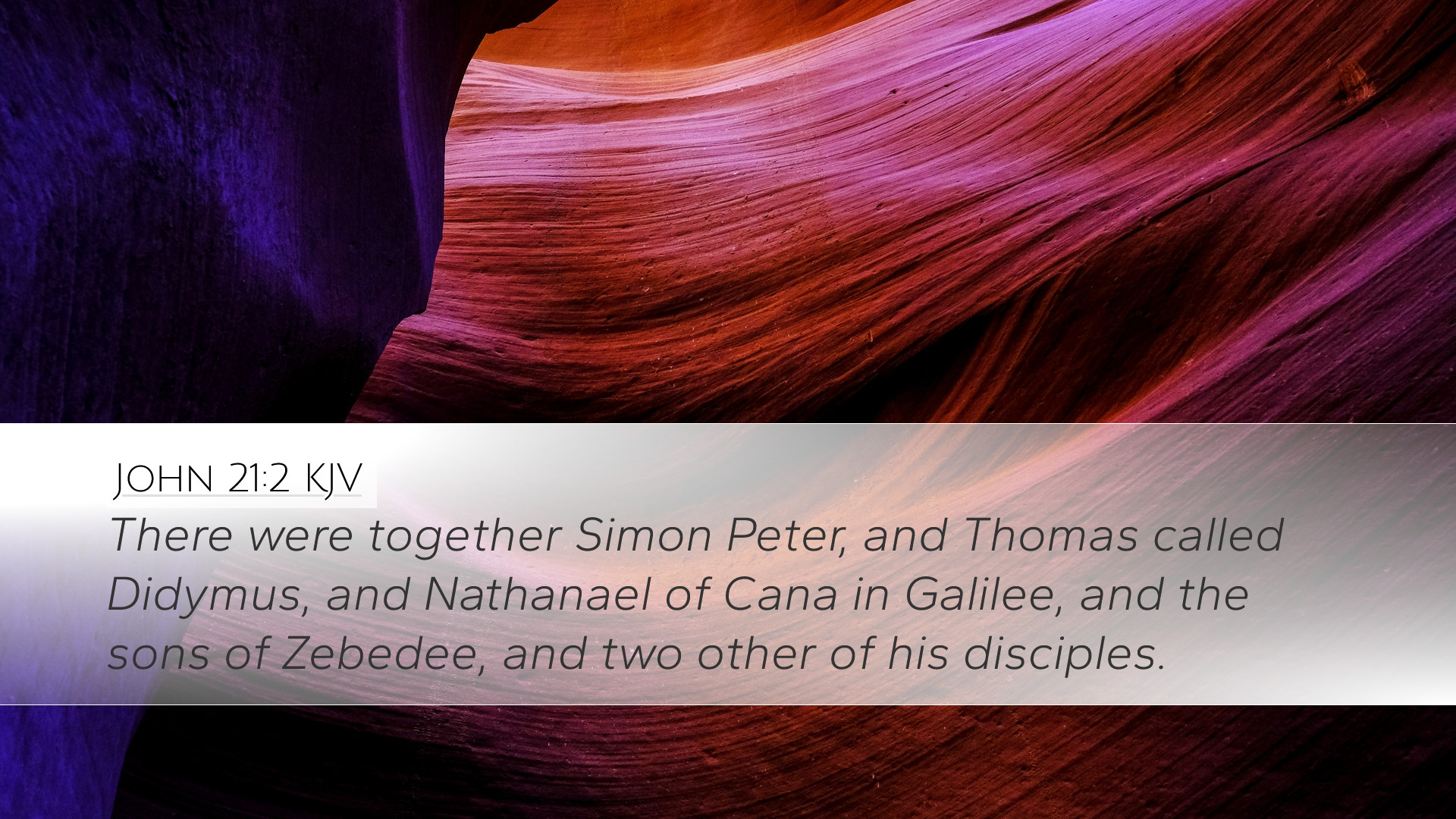Old Testament
Genesis Exodus Leviticus Numbers Deuteronomy Joshua Judges Ruth 1 Samuel 2 Samuel 1 Kings 2 Kings 1 Chronicles 2 Chronicles Ezra Nehemiah Esther Job Psalms Proverbs Ecclesiastes Song of Solomon Isaiah Jeremiah Lamentations Ezekiel Daniel Hosea Joel Amos Obadiah Jonah Micah Nahum Habakkuk Zephaniah Haggai Zechariah MalachiJohn 21:2
John 21:2 KJV
There were together Simon Peter, and Thomas called Didymus, and Nathanael of Cana in Galilee, and the sons of Zebedee, and two other of his disciples.
John 21:2 Bible Commentary
Commentary on John 21:2
In John 21:2, we see a critical moment that reveals not only the actions of the disciples but also the heart of their leader, Jesus Christ. The verse states:
“There were together Simon Peter, and Thomas called Didymus, and Nathanael of Cana in Galilee, and the sons of Zebedee, and two other of his disciples.”
Context and Background
This passage occurs after Christ's resurrection, during which time the disciples were in a state of confusion and uncertainty about their future and the direction of their ministry. They returned to their old ways to find solace, exemplifying a theme of struggle with the transition from the known to the unknown.
Analysis of Key Elements
- Gathering of Disciples:
The presence of Simon Peter, Thomas, Nathanael, the sons of Zebedee (James and John), and two other unnamed disciples signifies both unity and diversity among the early followers of Jesus. Matthew Henry notes that in moments of doubt, fellowship among believers is crucial. This gathering provides mutual encouragement as they wrestle with their recent experiences of loss and resurrection.
- Peter’s Leadership:
Peter’s role is particularly noteworthy. He had just undergone a profound encounter with the resurrected Christ but still wrestled with his sense of failure after denying Christ. Albert Barnes observes that Peter represents all of humanity's struggle with inadequacy even in the face of divine grace.
- The Implication of Names:
Each disciple mentioned carries symbolic weight. Thomas (the doubter), Nathanael (the seeker), and the sons of Zebedee (the fiery ones) reveal the variety of personalities within the community of faith. Adam Clarke comments on how these distinctions reflect the broad spectrum of experiences and thoughts in the journey of faith.
Theological Insights
Theologically, John 21:2 serves as a pivot point back to the call of discipleship. The disciples’ gathering implies a search for purpose. They chose to retreat to Galilee, perhaps seeking normalcy in their former lives as fishermen, which symbolizes the human tendency to revert to familiar habits during times of uncertainty, as noted by Matthew Henry.
Reconciliation and Restoration
This setting foreshadows the restoration of Peter in the following verses, where Jesus reinstates him as a leader among the disciples. In light of Peter’s previous denial, it suggests that failure does not disqualify one from service in God’s kingdom. Albert Barnes emphasizes that this highlights the grace of Christ which restores and renews those who falter.
Community and Mission
Furthermore, the gathering highlights the importance of community post-resurrection. The presence of multiple disciples signifies that the mission of Christ cannot be fulfilled in isolation. Adam Clarke points out that the disciples' reunion is a precursor to the Great Commission, illustrating that following Christ involves a community purpose and strength.
Application for Today
Pastors and theologians can derive indispensable lessons from this verse. It emphasizes that periods of doubt and confusion are natural in the journey of faith. Community support, understanding diverse experiences within the body of Christ, and reliance on God's grace in addressing failure are critical for congregational health today.
Encouragement in Ministry
- Embrace Community: Encourage believers to gather in times of uncertainty, fostering environments of support and accountability.
- Recognize Individual Struggles: Acknowledge that members may experience various challenges in faith, enhancing the church's approach to pastoral care.
- Promote Grace and Restoration: Teach that Christ’s grace is sufficient for all, empowering congregants to rise after failure.
Conclusion
John 21:2 poignantly encapsulates key elements of discipleship, community, and the continual state of grace necessary for a vibrant faith. As we reflect on this verse, may we be reminded of the vital role we play in each other's lives and the redemptive power available in Christ's name.


